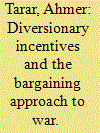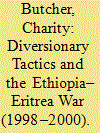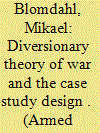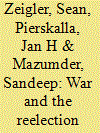| Srl | Item |
| 1 |
ID:
068978


|
|
|
| 2 |
ID:
168262


|
|
|
|
|
| Summary/Abstract |
Diversionary theories of war suggest that leaders may engage in bellicose foreign policies to divert the public’s attention from domestic problems and capitalize on a ‘rally around the flag’ type of effect. The evidence regarding diversionary theory is quite mixed. More recently, scholars have focused on situations that create opportunities for diversionary behavior, such as international rivalry and territorial disputes. This paper adds to the growing literature on diversionary conflict by considering the Ethiopia–Eritrea case and applying an opportunity-based approach. We assess whether the Ethiopia–Eritrea War (1998–2000) is consistent with diversionary explanations for the war, as many have previously claimed.
|
|
|
|
|
|
|
|
|
|
|
|
|
|
|
|
| 3 |
ID:
153628


|
|
|
|
|
| Summary/Abstract |
This article examines President Clinton’s decisions to launch military actions against Iraq in June 1993 and Kosovo in 1999. This study represents an attempt to test the descriptive accuracy and further developing the diversionary theory of war. Using a qualitative framework for diversionary use of force developed by another researcher, Ryan C. Hendrickson, this research examines and compares the two cases in order to determine whether or not these strikes appear to be diversionary in nature. This article generally suggests that empirical support for the diversionary argument in these cases is “mixed” but has more validity in the actions against Iraq. Two proposals to further develop qualitative tests for diversionary use of force are advanced.
|
|
|
|
|
|
|
|
|
|
|
|
|
|
|
|
| 4 |
ID:
056142


|
|
|
| 5 |
ID:
132323


|
|
|
|
|
| Publication |
2014.
|
| Summary/Abstract |
This article investigates the relationship between term limits and international conflict. Theories of political survival and diversionary war both imply term limits should play a role in international relations, whereas "permanent referendum theory," largely motivated by work in American politics, suggests otherwise. Drawing on these theories, we formulate and test competing hypotheses regarding term limits and international crises. Using dyadic militarized interstate disputes data and information on forty-eight democracies with term limits, we uncover strong evidence to support the claim that leaders reaching final terms in office are more likely to initiate conflict than those still subject to reelection. Moreover, we find that the likelihood of conflict initiation is significantly higher during times of recession, but only in the absence of binding term limits. While binding electoral terms and economic downturns are both independently associated with increased levels of conflict initiation, in concert their conditional effects actually counteract each other.
|
|
|
|
|
|
|
|
|
|
|
|
|
|
|
|
| 6 |
ID:
171220


|
|
|
|
|
| Summary/Abstract |
Why did Argentina risk seizing the Malvinas/Falkland Islands by force in 1982, provoking a war against Great Britain, and what are the larger implications of this case? We revisit this influential episode using counterfactual analysis to interpret newly declassified declarations of high-ranking state officials involved in the decision to occupy the islands. These sources cast doubt on the diversionary-war and miscalculation theses of the Malvinas/Falklands War, among other extant interpretations. Evidence suggests long-term power dynamics and prospect theory better explain Argentine foreign policy behavior leading to the war. Due to aversion to tangible losses, the leadership of waning states like Argentina might favor risky military strategies despite their low expected utility. These biases may provoke a war if decision-making groups are small and isolated from de-biasing influences. Our explanation illustrates the value of prospect theory to understand why certain declining states behave aggressively and more plausibly explains the Malvinas/Falklands War when confronted to set-theoretic counterfactual analysis.
|
|
|
|
|
|
|
|
|
|
|
|
|
|
|
|
| 7 |
ID:
084025


|
|
|
|
|
| Publication |
2008.
|
| Summary/Abstract |
Most of the burgeoning theoretical and empirical literature on the role of leaders in comparative politics and international relations is built on the assumption that leaders choose policies to stay in office. However, leaders can lose office in a variety of ways. Leaders can lose office as a result of ill health; they can lose office in a regular manner; or they can be removed in an irregular manner such as by a coup. How a leader loses office, moreover, significantly affects the leader's subsequent fate. A broader perspective on not just the probability, but also the manner of losing office-and its associated consequences-thus suggests an additional mechanism to explain the behavior of leaders. If policy significantly affects not just whether, but also how, leaders lose office, leaders might design policy to minimize the anticipated negative consequences of losing office. Once we unpack the manner in which leaders lose office, for example, we see that the postulated logic of diversionary war only holds for a subgroup of leaders: those who fear an irregular removal from office.
|
|
|
|
|
|
|
|
|
|
|
|
|
|
|
|